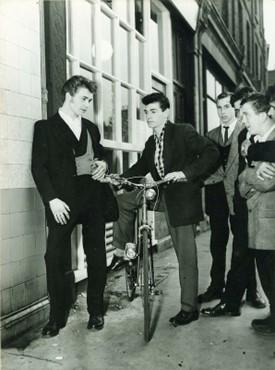
Folk devils serve as personifications of evil during times of moral panic. To date, however, few studies have addressed why some but not all deviant youths acquire folk devil status. Drawing on a combined cultural-historical criminology approach, this paper analyses the pop cultural representations which surrounded the Teddy Boys and Mods (British-oriented youth subcultures that emerged in the Irish Republic in 1954 and 1962 respectively). Both subcultures attracted a hostile societal response in mid-twentieth century Ireland, specifically as a result of their association with delinquency and immorality, and generally as a result of the wider societal changes they symbolised. This hostility, however, was not evenly dispersed. The paper argues that while Teds crossed the threshold from deviant to folk devil because of use of animalistic and epidemiological discourses by the press, Mods remained as ‘ordinary decent deviants’ due to mobilisation and extensive commodification. Analysis of these largely forgotten youth subcultures emphasises the need for greater analytical acuity to surround constructions of the folk devil across time and space.
